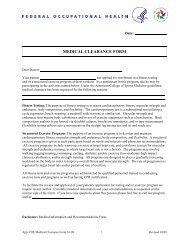Helping Others Cope With Grief - U.S. Department of Health and ...
Helping Others Cope With Grief - U.S. Department of Health and ...
Helping Others Cope With Grief - U.S. Department of Health and ...
You also want an ePaper? Increase the reach of your titles
YUMPU automatically turns print PDFs into web optimized ePapers that Google loves.
A LifeCare® Guide to <strong>Helping</strong> <strong>Others</strong> <strong>Cope</strong> <strong>With</strong> <strong>Grief</strong>If he or she doesn’t want to attend the funeral event, respect <strong>and</strong> support thatchoice. Talk to the child about participating in some other way, such as makingsomething to put in the casket—a card, picture or letter—or planning a timein the future to visit the gravesite or memorial marker. Remember that children do not usually sustain painful emotions for longperiods <strong>of</strong> time. Young children typically express feelings <strong>of</strong> sadness or angerfor a brief period <strong>of</strong> time, then run <strong>of</strong>f to play. They are <strong>of</strong>ten unable to sustainor tolerate painful emotions for long periods <strong>of</strong> time. This does not meanthe child has already forgotten or is minimally affected by the loss. It is simplythe child’s way <strong>of</strong> signaling that he or she has had all the pain he or she cantolerate for a period <strong>of</strong> time. The child will probably return to his or her feelings,questions or need to participate in grief-related events later. Underst<strong>and</strong> how children work through their feelings. Children workthrough their feelings in play, <strong>and</strong> express their feelings through behavior.Don’t be alarmed if a child is expressing a great deal <strong>of</strong> sadness or anger in hisor her play, as long as he or she is not harmful to him or herself or others. Achild’s feelings may only become a problem if they do not have the appropriateoutlet. If a child seems irritable <strong>and</strong> angry, tell him or her that you underst<strong>and</strong>he or she feels angry, <strong>and</strong> that it is normal under the circumstances. If,on the other h<strong>and</strong>, he or she is getting into fist fights with peers, breakingthings or engaging in any other destructive behaviors, the child probably needsmore support, <strong>and</strong> definitely needs help finding constructive ways to channelhis or her painful feelings. If this is the case, consider seeking pr<strong>of</strong>essionalhelp. Help children underst<strong>and</strong> their feelings. After a person’s death, childrenmay have difficulty underst<strong>and</strong>ing their emotions. Help the grieving childknow that his or her feelings are normal, even though they are unfamiliar. Byhelping the child identify his or her feelings, you encourage him or her tobuild coping tools that will grow over time. For example, if a child is irritableor argumentative, tell him, “I know you feel angry that your mom died. Itdoesn’t seem fair, does it? You know, I feel angry sometimes, too.” Or, “I knowyou’re sad; so am I. Sometimes when I’m sad, I cry. Do you?” Remember that the process <strong>of</strong> grieving varies throughout a person’s life.As a child grows—<strong>and</strong> his or her underst<strong>and</strong>ing <strong>of</strong> death <strong>and</strong> loss evolves—thechild may continually rework the meaning <strong>of</strong> his or her loss. The loss <strong>of</strong> aparent, for example, may mean something different to a child as he or she goesthrough puberty, begins to date, graduates high school, leaves home, has ababy, etc. <strong>With</strong> support, children may find ways to adapt to the loss, keep theirloved ones with them <strong>and</strong> invest in the future. Anticipate <strong>and</strong> address the child’s fears. Children, like adults, <strong>of</strong>ten feelvulnerable after the death <strong>of</strong> a loved one. If a parent dies, the child needsreassurance that he or she will be taken care <strong>of</strong>, <strong>and</strong> that everything will beokay. Maintain daily routines as much as possible to help the child re-establisha sense <strong>of</strong> safety.After the death <strong>of</strong> a gr<strong>and</strong>parent, parent or other significant person, children<strong>of</strong>ten fear that other important people in their life will die. Avoid empty reassurances.Rather than promising that nothing bad will ever happen to you orother adults <strong>and</strong> friends, stress that people are here now to care for him or her.Page 12















